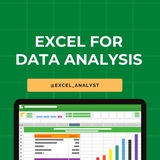🧑💼 Interviewer: What's the difference between VLOOKUP and HLOOKUP in Excel?
👨💻 Me: VLOOKUP searches vertically down columns (great for column-based data like employee lists), while HLOOKUP searches horizontally across rows (ideal for row-based setups like category headers).
✔ Key Differences:
– VLOOKUP: Looks for a value in the first column of a range, returns from the same row in a specified column—syntax:
– HLOOKUP: Looks for a value in the first row of a range, returns from the same column in a specified row—syntax:
📌 Example:
Vertical sales table (IDs in col A, amounts in B): VLOOKUP(ID, A:B, 2, FALSE) gets amount.
Horizontal (months in row 1, sales in row 2): HLOOKUP("Jan", 1:3, 2, FALSE) gets Jan sales.
💡 VLOOKUP's more common (90% of lookups), but both support exact (FALSE) or approx (TRUE) matches—switch to XLOOKUP in modern Excel for bidirectional flexibility!
💬 Tap ❤️ for more!
👨💻 Me: VLOOKUP searches vertically down columns (great for column-based data like employee lists), while HLOOKUP searches horizontally across rows (ideal for row-based setups like category headers).
✔ Key Differences:
– VLOOKUP: Looks for a value in the first column of a range, returns from the same row in a specified column—syntax:
=VLOOKUP(lookup_value, table_array, col_index_num, [range_lookup]). Use for vertical data; e.g., find salary by ID in a table. – HLOOKUP: Looks for a value in the first row of a range, returns from the same column in a specified row—syntax:
=HLOOKUP(lookup_value, table_array, row_index_num, [range_lookup]). Use for horizontal data; e.g., pull metrics by month across a header row.📌 Example:
Vertical sales table (IDs in col A, amounts in B): VLOOKUP(ID, A:B, 2, FALSE) gets amount.
Horizontal (months in row 1, sales in row 2): HLOOKUP("Jan", 1:3, 2, FALSE) gets Jan sales.
💡 VLOOKUP's more common (90% of lookups), but both support exact (FALSE) or approx (TRUE) matches—switch to XLOOKUP in modern Excel for bidirectional flexibility!
💬 Tap ❤️ for more!
❤2
✅Excel Checklist for Data Analysts 📀🧠
1️⃣ Excel Basics
▪ Formulas & Functions (SUM, IF, VLOOKUP, INDEX-MATCH)
▪ Cell references: Relative, Absolute & Mixed
▪ Data types & formatting
2️⃣ Data Manipulation
▪ Sorting & Filtering data
▪ Remove duplicates & data validation
▪ Conditional formatting for insights
3️⃣ Pivot Tables & Charts
▪ Create & customize Pivot Tables for summaries
▪ Use slicers & filters in Pivot Tables
▪ Build charts: Bar, Line, Pie, Histograms
4️⃣ Advanced Formulas
▪ Nested IF, COUNTIF, SUMIF, AND/OR logic
▪ Text functions: LEFT, RIGHT, MID, CONCATENATE
▪ Date & Time functions
5️⃣ Data Cleaning
▪ Handling blanks/missing values
▪ TRIM, CLEAN functions to fix data
▪ Find & replace, Flash fill
6️⃣ Automation
▪ Macros & VBA basics (record & edit)
▪ Use formula-driven automation
▪ Dynamic named ranges for flexibility
7️⃣ Collaboration & Sharing
▪ Protect sheets & workbooks
▪ Track changes & comments
▪ Export data for reporting
8️⃣ Data Analysis Tools
▪ What-if analysis, Goal Seek, Solver
▪ Data Tables and Scenario Manager
▪ Power Query basics (optional)
9️⃣ Dashboard Basics
▪ Combine Pivot Tables & Charts
▪ Use form controls & slicers
▪ Design interactive, user-friendly dashboards
🔟 Practice & Projects
▪ Analyze sample datasets (sales, finance)
▪ Automate monthly reporting tasks
▪ Build a portfolio with Excel files & dashboards
💡 Tips:
⦁ Practice with real datasets to apply functions & Pivot Tables
⦁ Learn shortcuts to boost speed
⦁ Combine Excel skills with Python & SQL for powerful analysis
Excel Learning Resources:
https://whatsapp.com/channel/0029VaifY548qIzv0u1AHz3i
Double Tap ♥️ For More
1️⃣ Excel Basics
▪ Formulas & Functions (SUM, IF, VLOOKUP, INDEX-MATCH)
▪ Cell references: Relative, Absolute & Mixed
▪ Data types & formatting
2️⃣ Data Manipulation
▪ Sorting & Filtering data
▪ Remove duplicates & data validation
▪ Conditional formatting for insights
3️⃣ Pivot Tables & Charts
▪ Create & customize Pivot Tables for summaries
▪ Use slicers & filters in Pivot Tables
▪ Build charts: Bar, Line, Pie, Histograms
4️⃣ Advanced Formulas
▪ Nested IF, COUNTIF, SUMIF, AND/OR logic
▪ Text functions: LEFT, RIGHT, MID, CONCATENATE
▪ Date & Time functions
5️⃣ Data Cleaning
▪ Handling blanks/missing values
▪ TRIM, CLEAN functions to fix data
▪ Find & replace, Flash fill
6️⃣ Automation
▪ Macros & VBA basics (record & edit)
▪ Use formula-driven automation
▪ Dynamic named ranges for flexibility
7️⃣ Collaboration & Sharing
▪ Protect sheets & workbooks
▪ Track changes & comments
▪ Export data for reporting
8️⃣ Data Analysis Tools
▪ What-if analysis, Goal Seek, Solver
▪ Data Tables and Scenario Manager
▪ Power Query basics (optional)
9️⃣ Dashboard Basics
▪ Combine Pivot Tables & Charts
▪ Use form controls & slicers
▪ Design interactive, user-friendly dashboards
🔟 Practice & Projects
▪ Analyze sample datasets (sales, finance)
▪ Automate monthly reporting tasks
▪ Build a portfolio with Excel files & dashboards
💡 Tips:
⦁ Practice with real datasets to apply functions & Pivot Tables
⦁ Learn shortcuts to boost speed
⦁ Combine Excel skills with Python & SQL for powerful analysis
Excel Learning Resources:
https://whatsapp.com/channel/0029VaifY548qIzv0u1AHz3i
Double Tap ♥️ For More
❤2
